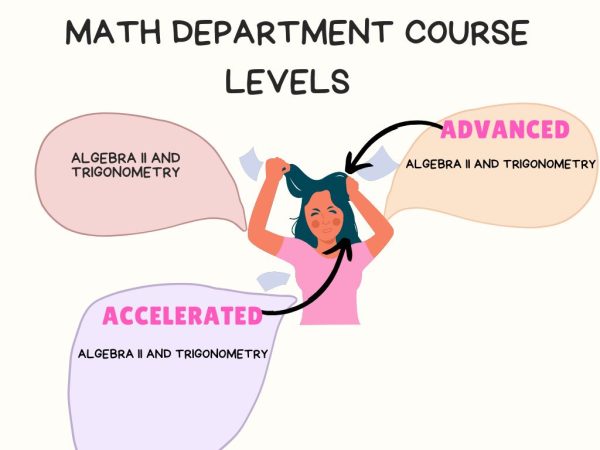Hackley’s Grading System is Flawed
We Should Emphasize Effort and Sustained Learning
Credit: Olivia Weinberg
With exams behind them and a third trimester ahead, many Hackley students are now beginning to assess where they stand in terms of an end of their year grade in all of their classes. Some may be thinking, “If I got an A in the first two trimesters in history this year, and an A- on the exam, do I really need to get another A in the last trimester to get an A for the year?” Others may be thinking, “If I got an A in the first two trimesters in biology this year, and a B on the exam, what do I need to do to still get an A for the year? Can I even get an A for the year with this exam grade?”
It is natural to step back and assess how one is doing in school after exams. It is natural to do some calculations in terms of grades. And, it is natural to want to relax if a student is aware that his or her grade in the third trimester can drop just a bit, and he or she will still receive the end of the year grade that he or she wants.
Senior Arielle Stern sums up the mentality this way: “For bio last year I realized I could get two different grades for the third trimester and still end up with the same end of year grade, so I didn’t work as hard in the last trimester because of that. Also, in Latin one year after the exam, I couldn’t get the year end grade I’d initially wanted, so I didn’t try that hard third trimester, which was kind of nice because it made the class a lot less stressful.”
This strategy of students to correlating their effort in school solely to their end-year grades is obviously out of line with Hackley’s mission and values – and this phenomenon is perpetuated by Hackley’s exam and grade-weighting system.
Hackley’s eleven point grading system, along with the 27% weight on each of the three trimesters and 19% weight on the exams, allows students to strategically plan how hard they need work in the third trimester of the year in order to receive the end of the year grade that they want. However, Hackley’s grading system is not the primary problem here; the primary problem is the culture that surrounds us – the culture that prioritizes high grades and top colleges over the true experience of learning and growing as an individual.
Math Department Head Diana Kaplan said, “I don’t know how we can battle against this idea of the grades being everything. There are all of these wonderful students who define themselves as a single letter. You guys are more than just a letter. It doesn’t matter what you get in my class. That’s not how I think of you. You are an individual person.”
With this, it is clear that Hackley’s grading and weighting system should be altered so that students cannot have this much control over their third trimester work ethic. Unfortunately, The Dial cannot propose a realistic and timely solution for this large cultural issue that spans across the nation, but we do believe that Hackley can make some changes in its grading system that could help address this issue.
The idea of having midterms and then finals at the end of the year is a possible solution to this issue. With finals at the end of the year, students cannot step back and assess their grade to the degree to which Hackley students currently can. For Hackley students, finals beyond the third trimester would provide the opportunity to improve, but also to destroy one’s grade, therefore, students would have to keep up their effort level through finals.
Not all Hackley students take advantage of this potential time to slack off, and that is simply a reflection of the quality of the Hackley student body.
Senior Jason Traum said, “I always try to do well in the first two trimesters and on exams. Until this year I wouldn’t say I’ve slacked off third trimester, but I know that by doing well it gives me room to relax a bit third trimester and this year, as a senior I will actually relax a little. As a senior most of my classes are ones I’ve chosen and am genuinely interested in so I still want to do well in those classes.”
Although Jason is just one of many Hackley students who have great work ethics, respect for their teachers, and genuine interests in their classes, he seems to be in the minority of Hackley students who do keep up their highest level of work ethic even when they don’t need to, as 60% of Upper School students polled say that their effort in the third trimester changes.
The grading culture here at Hackley cannot be blamed on the school itself. The blame must be put on the social culture that surrounds Hackley in Westchester and in this country as a whole. If the cultural values of grades being everything are what is driving this attitude for students, what is Hackley supposed to do about it? To try and combat and drastically change the Westchester culture is fairly impossible, so the change must come from within the school. But, how much will that change really affect anything?
As Ms. Kaplan put it, “Unfortunately, no matter what system you have, unless we have secret grades where we don’t tell you what you have until the very end of the year, you can calculate your grade, and you can figure out where you stand. You would be locked out of some grades, whether it’s an 11-point system or an 100-point system. Kids can always calculate grades – that’s not the fault of the system, it’s just the cultural craziness that we have about grades here. So, to me, the question really is, how do we get the students to understand that the grades are not the be all end all?”
Ultimately, Ms. Kaplan poses the most important question – what can Hackley do to combat this “cultural craziness?” Does Hackley even have the power to do anything that will make a difference? Either way, Hackley owes it to its community to try – and that effort must start with the grading system.






